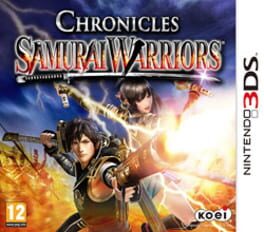I’m disappointed that this game doesn’t get the love it deserves. I don’t doubt that this game would bounce off many people as it’s not a particularly flashy or immediately captivating Musou, but I think it’s worth acknowledging for the new ideas it brought to the table.
For starters, this is the first SW entry, if not Musou game in general, that allows the player to select 4 characters for each level to swap control between and issue commands to when not controlled. I cannot stress how much I love this design decision; SW3’s maps (which this game borrows) are notably large and while the pacing feels sluggish in that game due to the sometimes-large distance the player has to cover between objectives, in Chronicles you can instead command your other characters to travel to different corners of the map as you focus on the objective in front of you. This accelerates the pacing greatly as you can effectively teleport to your destinations instantly when used correctly while still capturing the grander sense of scale that the maps were designed to convey. It also taps into the tactical edge of Musou that, while admittedly light, gives them a different flavor compared to most other games of a similar make. You will have to make decisions about which characters you want to delegate to each objective based on their distance and your comfort level in controlling them, and how to make the most of characters who don’t have any objectives to delegate.
I also think the create-a-character protagonist is used to great effect here: in contrast to Dynasty Warriors, SW doesn’t have clearly defined factions, instead following dozens of individual figures who frequently shift allegiances. This allows for some more interesting personal narratives but to those not familiar with the general history of the Sengoku era, it can be easy to lose track of what’s happening. Chronicles is a great way to familiarize yourself with the who’s who and the big events of the era by allowing a more objective viewpoint that covers the entirety of the era while still feeling like there’s some sort of stake to what’s happening. Attached to that are the bonding events that allow a far more personal view of each character than any of the prior games allowed and gives them some real emotional complexity, revealing their inner conflicts and motivations and even culminating in “endings” that gives closure to their character arcs. With about 40 characters, it’s impressive that Chronicles put so much care in making them all compelling and three-dimensional, which serves to underscore the many tragedies that occur in the larger story.
This was my first SW game, and the way the game really plays to the unique strengths of SW in contrast to DW made me a fan. Chronicles was crucial in both correcting course after the middling SW3 and shaping SW’s identity for years to come, with some features originating from this game persisting even into the soft reboot that was SW5, and deserves to remembered as more than just another spin-off.
For starters, this is the first SW entry, if not Musou game in general, that allows the player to select 4 characters for each level to swap control between and issue commands to when not controlled. I cannot stress how much I love this design decision; SW3’s maps (which this game borrows) are notably large and while the pacing feels sluggish in that game due to the sometimes-large distance the player has to cover between objectives, in Chronicles you can instead command your other characters to travel to different corners of the map as you focus on the objective in front of you. This accelerates the pacing greatly as you can effectively teleport to your destinations instantly when used correctly while still capturing the grander sense of scale that the maps were designed to convey. It also taps into the tactical edge of Musou that, while admittedly light, gives them a different flavor compared to most other games of a similar make. You will have to make decisions about which characters you want to delegate to each objective based on their distance and your comfort level in controlling them, and how to make the most of characters who don’t have any objectives to delegate.
I also think the create-a-character protagonist is used to great effect here: in contrast to Dynasty Warriors, SW doesn’t have clearly defined factions, instead following dozens of individual figures who frequently shift allegiances. This allows for some more interesting personal narratives but to those not familiar with the general history of the Sengoku era, it can be easy to lose track of what’s happening. Chronicles is a great way to familiarize yourself with the who’s who and the big events of the era by allowing a more objective viewpoint that covers the entirety of the era while still feeling like there’s some sort of stake to what’s happening. Attached to that are the bonding events that allow a far more personal view of each character than any of the prior games allowed and gives them some real emotional complexity, revealing their inner conflicts and motivations and even culminating in “endings” that gives closure to their character arcs. With about 40 characters, it’s impressive that Chronicles put so much care in making them all compelling and three-dimensional, which serves to underscore the many tragedies that occur in the larger story.
This was my first SW game, and the way the game really plays to the unique strengths of SW in contrast to DW made me a fan. Chronicles was crucial in both correcting course after the middling SW3 and shaping SW’s identity for years to come, with some features originating from this game persisting even into the soft reboot that was SW5, and deserves to remembered as more than just another spin-off.
